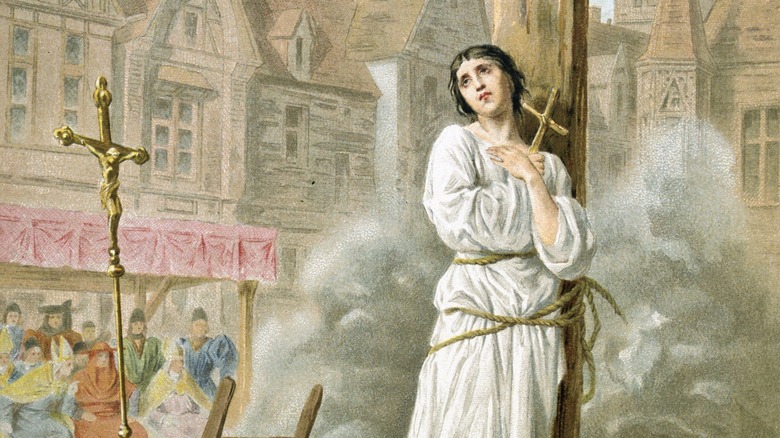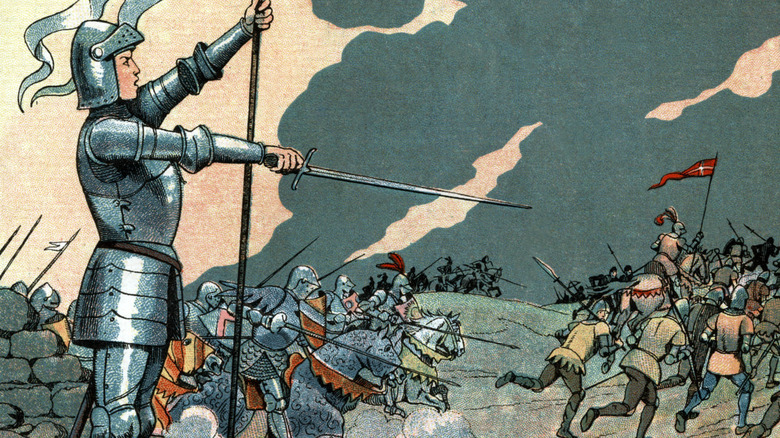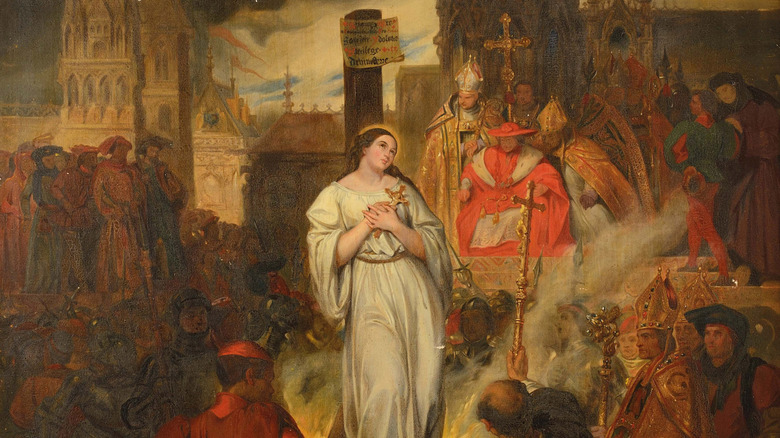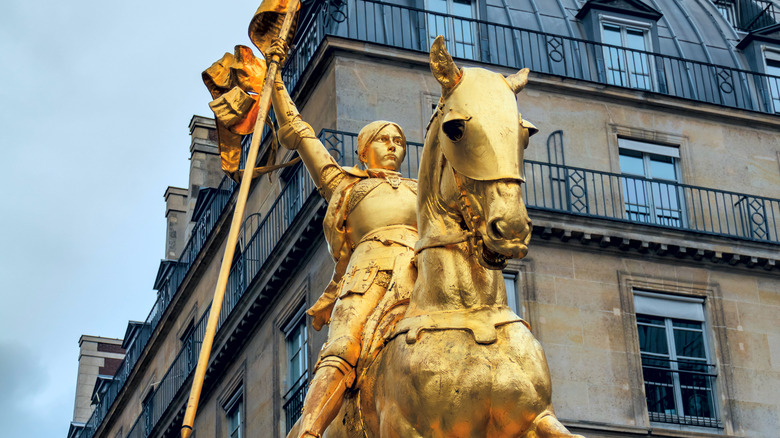Joan Of Arc's Tragic Final Words Before Her Execution
The English soldiers roughly pushed Joan toward the wooden pyre, which would soon be a raging inferno and the tool for her gruesome death. It was May 1431, and the woman who called herself Jehanne la Pucelle (Joan the Maid) was about to be executed. In only three years, she'd risen from the illiterate daughter of a peasant to the head of a French army. History remembers her as Joan of Arc, a virginal teenage warrior in white armor, a Catholic saint and martyr, and the woman who fought the odds and medieval gender roles only to be betrayed by the man she helped make a king.
As Joan headed toward her death, she asked for a cross to hold during her execution. An English man in the crowd hastily crafted one from a stick and handed it to her. She kissed it, said a prayer, and slipped it into her clothing. Once she'd reached the top of the scaffold, she stood staring at a large crucifix held aloft by a compassionate priest. She continued to pray and keep her eyes on it as the wood ignited and flames leaped up around her. Those watching could clearly hear her final words above the intense roar of the fire, but what did she say during her final moments?
Joan of Arc's divine calling
When Joan of Arc was 13, she began hearing voices, which she believed came from God and anointed her with a sacred mission to expel the English from her homeland. At the time, the English and their French allies, the Burgundians, controlled much of northern France. A peace treaty between the Burgundians and the English cut out Charles of Valois, the heir to the French throne. Joan's vision included restoring Charles to his rightful place as the king of France.
In February 1429, Joan went to Charles and convinced him to give her an army to stop the English and their allies, who had laid siege to the city of Orleans. In defiance of his counselors, Charles agreed, and that March, Joan led her soldiers to a stunning victory, saved Orleans, and helped Charles regain his crown. Soon Joan's prowess on the battlefield and mystical visions attracted supporters and enemies, both English and French.
Joan of Arc's last words convinced her executioner to repent
During the defense of Compiégne, Joan of Arc fell from her horse, and a Burgundian army captured her and turned her over to the English. They charged Joan with witchcraft and heresy, among other crimes, and eventually sentenced her to death. The English blamed their losses on Joan's supposedly supernatural powers. According to "Joan of Arc: The Image of Female Heroism" by Marina Warner, the duke of Bedford called her "a disciple and limb of the Fiend" who used "false enchantment and sorcery."
After an advisor warned him Joan was becoming too powerful, Charles of Valois, who had become King Charles VII thanks in part to Joan, refused to intercede on her behalf via negotiations — as was common — and let her die. According to "Joan of Arc by Herself and Her Witnesses" by Régine Pernoud, Jean Massieu, a priest who comforted Joan at her execution, later recalled her final moments, saying, "And so was she taken and bound, still continuing praises and lamentations to God and the saints, and whose last word, in departing this life, cried in a loud voice: 'Jesus.'"
The English executioner, after lighting the fire, became overwhelmed with emotion and had to be led away. They took him to a nearby tavern, and it took several strong drinks to calm his nerves. He later said he had "sinned gravely" and repented for executing "a saintly woman." In the ensuing years, Joan's mythic status would continue to grow.
The aftermath of Joan's death
The English executioner apparently wasn't the only person to feel remorse for their actions against Joan of Arc. In 1450, nearly 20 years after Joan's execution, King Charles VII ordered an investigation into Joan's trial that helped clear her name. Other investigations followed, including one Pope Calixtus III held in 1455 — a retrial that completely exonerated Joan of the earlier charges of heresy and witchcraft. Joan's fame continued to grow, and in 1920, Pope Benedict XV canonized her as a Catholic saint.
While historians debate the importance Joan played in the Hundred Years' War between England and France, her role in leading the French army that lifted the siege of Orleans helped stop England's invasion of France and solidified Charles' power. While the war didn't end for another 22 years after Joan's execution, her importance in uniting France through the people's veneration of her over generations eventually earned Joan the status of the patron saint of France and of soldiers.



